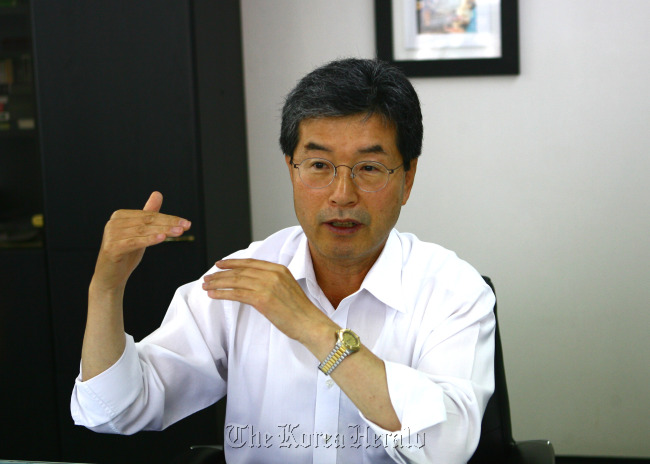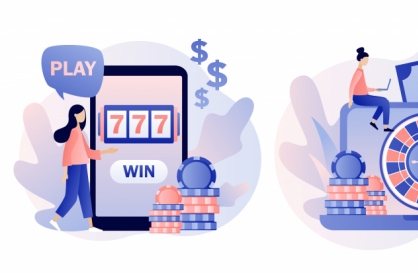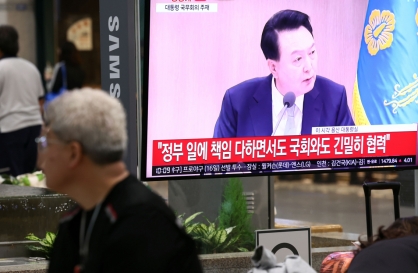Premium home appliance maker hopes to win Korean consumers for 100 years, CEO says
Anyone in Korea who has lived in Germany or other parts of Europe before uses it.
Rhie Won-bok, who studied in Germany and is known for his comic books “Far Countries, Neighboring Countries,” uses it. Cha bum-kun, who played soccer in Germany and is a regular World Cup newscaster, uses it. Yoon Boo-keun, CEO of Samsung Electronics’ consumer electronics division, praised it during his visit to Germany’s IFA electronics tradeshow.
And that is German’s premium home appliance brand Miele.
Miele’s washing machines, dryers and vacuum cleaners may be too expensive for regular Korean customers, but they are worth the price for their reliability and durability, Ahn Kyu-moon, CEO of Miele Korea, told The Korea Herald.
Its washing machines cost more than $2,000 and vacuum cleaners $400. In comparison, when the standard price of consumer electronic products is set at 100, Miele goods are worth 240, while Electrolux is 150, and Siemens, Bosch, Samsung and LG are about 130.
All “ultra premium” products offered by Miele last as long as 20 years, which make it a key difference from competing goods by Samsung Electronics, LG Electronics and Electrolux.
The other distinctive features are that they are quiet, and for instance, its vacuum cleaners absorb 99.9 percent of dust particles, Ahn noted.
“We don’t use any tricks with our products,” Ahn emphasized during the interview.
Anyone in Korea who has lived in Germany or other parts of Europe before uses it.
Rhie Won-bok, who studied in Germany and is known for his comic books “Far Countries, Neighboring Countries,” uses it. Cha bum-kun, who played soccer in Germany and is a regular World Cup newscaster, uses it. Yoon Boo-keun, CEO of Samsung Electronics’ consumer electronics division, praised it during his visit to Germany’s IFA electronics tradeshow.
And that is German’s premium home appliance brand Miele.
Miele’s washing machines, dryers and vacuum cleaners may be too expensive for regular Korean customers, but they are worth the price for their reliability and durability, Ahn Kyu-moon, CEO of Miele Korea, told The Korea Herald.
Its washing machines cost more than $2,000 and vacuum cleaners $400. In comparison, when the standard price of consumer electronic products is set at 100, Miele goods are worth 240, while Electrolux is 150, and Siemens, Bosch, Samsung and LG are about 130.
All “ultra premium” products offered by Miele last as long as 20 years, which make it a key difference from competing goods by Samsung Electronics, LG Electronics and Electrolux.
The other distinctive features are that they are quiet, and for instance, its vacuum cleaners absorb 99.9 percent of dust particles, Ahn noted.
“We don’t use any tricks with our products,” Ahn emphasized during the interview.

The company absolutely ensures its customers that “Miele equals 20 years,” he said, adding that it can fix all products used for even longer than 20 years if customers ask for after-sales service as Miele keeps all of its components.
Design is also a key part of Miele brand’s sustainability.
Should customers use it for 20 years, it would have to give a feeling of “fresh” whenever they use Miele, Ahn said.
Otherwise, customers’ trust and recognition of Miele would crumble, and Miele would not have lasted this long.
“You can’t sacrifice trust and reliability for short-term gains,” he stressed.
Miele has been around for 113 years, making it one of the oldest private German companies. It has been owned and headed by the Miele and Zinkann families.
When Miele established its Korean subsidiary in 2005, Ahn, Miele’s first locally appointed CEO, saw challenges in the country, which was considered a “graveyard for foreign consumer electronics.”
There was no way to get an edge over Samsung and LG, which account for over a 90 percent share of the home appliance market. And Miele did not want to compete with them, or be near them, so to speak.
Even Japanese giants such as Sony and Toshiba could not gain a foothold in Korea.
The best way for Miele then was to maintain its prestige brand image by targeting the top 1 percent income group, or Ahn called it the “aristocrats,” living mainly in the affluent Gangnam district in southern Seoul.
It only placed and marketed its products at premium corners within shopping centers, as compared to dealerships in Europe and the U.S.
He went ahead to develop an Internet shopping mall for Miele products, despite doubts that it could work for such a premium brand. But it proved to be a success in the country full of tech-savvy consumers.
As the word of mouth spread on Miele, the Korean subsidiary was able to attract customers outside of Gangnam, for instance, in Daegu and Busan, while gradually increase its reach to the top 5 percent income group.
Ahn said that as the standard of living further improves in Korea, customers are bound to seek more premium and reliable brands.
More and more newlyweds are opting for Miele, Ahn noted. Although it would be expensive for them to purchase at the moment, it is more cost-efficient in the long-term given that they can use it for 20 years.
With momentum building for Miele Korea, which saw its sales double and retail capacity triple since its establishment, Ahn’s next goal for Miele in Korea is to make it last as long as its German headquarters.
“I hope Miele will be among Koreans for the next 100 years, and become part of Korea,” he said.
By Park Hyong-ki (hkp@heraldcorp.com)







![[From the Scene] Monks, Buddhists hail return of remains of Buddhas](http://res.heraldm.com/phpwas/restmb_idxmake.php?idx=644&simg=/content/image/2024/04/19/20240419050617_0.jpg&u=20240419175937)







![[From the Scene] Monks, Buddhists hail return of remains of Buddhas](http://res.heraldm.com/phpwas/restmb_idxmake.php?idx=652&simg=/content/image/2024/04/19/20240419050617_0.jpg&u=20240419175937)

![[KH Explains] Hyundai's full hybrid edge to pay off amid slow transition to pure EVs](http://res.heraldm.com/phpwas/restmb_idxmake.php?idx=652&simg=/content/image/2024/04/18/20240418050645_0.jpg&u=20240419100350)

![[Today’s K-pop] Illit drops debut single remix](http://res.heraldm.com/phpwas/restmb_idxmake.php?idx=642&simg=/content/image/2024/04/19/20240419050612_0.jpg&u=)